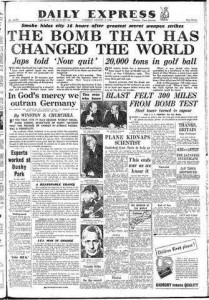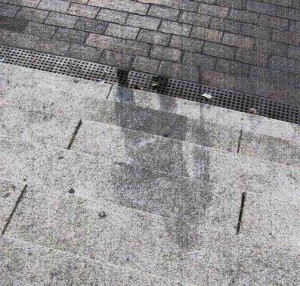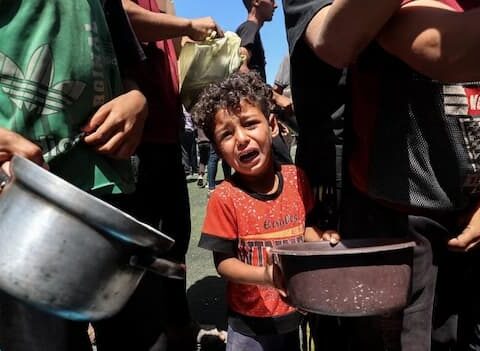On the 70th anniversary of the dropping of the Atomic Bomb on Hiroshima, the world-changing event – which, combined with the bombing of Nagasaki, is the only (officially) recorded use of a nuclear bomb against an enemy target – still divides opinion.
The famous, haunting statement by Robert J. Oppenheimer, recalling the event, always compels and haunts in equal measure; probably from a combination of the quote itself and Oppenheimer’s odd delivery.
In 1965, Oppenheimer was asked to repeat the quote again for a television broadcast: “We knew the world would not be the same. A few people laughed, a few people cried. Most people were silent. I remembered the line from the Hindu scripture, the Bhagavad Gita; Vishnu is trying to persuade the Prince that he should do his duty and, to impress him, takes on his multi-armed form and says, ‘Now I am become Death, the destroyer of worlds’.“
Although recorded by some contemporaries as having displayed a triumphal attitude towards the successful testing and development of the bomb, Oppenheimer in fact went to Washington on August 17th to hand-deliver a letter to the Secretary of War, Henry L. Stimson, expressing his anger at what had happened in Japan and his desire to see nuclear weapons completely banned.
Two months later, in October 1945, Oppenheimer was granted an interview with President Harry S Truman. The meeting, however, is said to have taken a bad turn when Oppenheimer remarked that he felt he had “blood on my hands.” The comment allegedly infuriated Truman, who stormed out of the meeting. Truman is alleged to have later told his Undersecretary of State, Dean Acheson, “I don’t want to see that son of a bitch in this office ever again.”
The uranium ‘gun-type’ atomic bomb named ‘Little Boy’ was dropped on Hiroshima by the Enola Gay on August 6th 1945, followed by the plutonium implosion-type bomb named ‘Fat Man’ on Nagasaki on August 9th. ‘Little Boy’ exploded 2,000 feet above the city of Hiroshima with a blast equal to 12-15,000 tons of TNT, destroying five square miles of the city. Within the first two to four months of the bombings, the effects are said to have killed 90,000–166,000 people in Hiroshima and 39,000–80,000 in Nagasaki.
During the following months, large numbers more died from the effects of the burns, the radiation sickness, and other injuries, along with general illness and malnutrition. In both cities, most of the dead were civilians (however, Hiroshima did also host a large military garrison).
Beyond this, around 1,900 cancer deaths have been attributed to the long-term after-effects of the bombs, with studies suggesting some 46% of leukemia deaths and 11% of cancer deaths among the survivors were due to radiation from the bombs.
There was a degree of denial in American discourse and perception for a long time about how devastating the longer-term effects of the radiation were in Japan, and a broad suppression of information.
It is interesting to note that many ordinary Americans still maintain the atomic bombings of Hiroshima and Nagasaki were entirely necessary.
Not that I can categorically disagree with that; there is clearly an argument to be made that it brought the war to an end much quicker, prevented what might’ve been months or even years more of drawn-out war and American or European casualties. Japan had already been given numerous opportunities to surrender and had declined.
However, there isn’t really a moral equivalence between Hiroshima/Nagaski and Pearl Harbour, the latter being an attack on a military target, the former being indiscriminate annihilation of civilian populations.
But it is curious to remember that, during the war, the “annihilationist and exterminationalist rhetoric” was generally accepted at all levels of American society and discourse; according to the British embassy in Washington, Americans regarded the Japanese as “a nameless mass of vermin”. Caricatures depicting Japanese as less than human (as monkeys, for example) were common, reminiscent of the caricaturing and dehumanisation of European Jews in Nazi Europe.
A 1944 opinion poll that asked what should be done with Japan found that 13% of the American public were in favor of complete, Hitler-style extermination, “killing off” all Japanese men, women and children.
Which, even given the polarisation of opinion and perceptions that perhaps comes with war, is a little disturbing; particularly given what actually then went on to happen in Hiroshima and Nagasaki. It is perhaps, more than anything else, simply demonstrative of the general ugliness of war, not just on the battlefield but also in the psychology of the participating nations and popular opinion.

Was it justified? It has to be said that Hiroshima/Nagasaki is one of the trickiest historical subjects to answer categorically or have an absolute opinion on.
Yes, it ended the war quicker; some would say by ‘cheating’, or in other words acting outside of the ‘rules’ of war. But this was ‘Total War’, as the phrase goes, which some would argue meant all rules were out and ‘anything goes’. And if Japan at that time had possessed the nuclear bomb, they almost certainly would’ve used it. And there’s no question that the Japanese regime of the time was itself guilty of War Crimes in the region and was perhaps just as extreme as their Nazi allies in Europe.
That doesn’t, however, make the dropping of the atomic bombs any less a ‘War Crime’, even if it could be strategically justified.
If merely ending the war was the objective, along with providing a demonstration of this new Doomsday Device of mass-destructive capability, I’ve always wondered whether a less populated target-area could’ve just as easily provided that demonstration of power. There’s also the question of why Nagasaki was bombed three days later, when Hiroshima had already provided the demonstration – though there is a counter-argument that the Japanese still hadn’t formally surrendered prior to the Nagasaki detonation on August 9th.
Among early critics of the bomb were Albert Einstein, Eugene Wigner and Leó Szilárd, who had all rejected, on moral grounds, the first atomic bomb research in 1939, and wrote a jointly written letter to President Roosevelt. Szilárd, who had gone on to play a major role in the Manhattan Project, argued: “Suppose Germany had developed two bombs before we had any bombs. And suppose Germany had dropped one bomb, say, on Rochester and the other on Buffalo, and then having run out of bombs she would have lost the war. Can anyone doubt that we would then have defined the dropping of atomic bombs on cities as a war crime, and that we would have sentenced the Germans who were guilty of this crime to death at Nuremberg and hanged them?”
Which is the pertinent point. The Nuremberg Trials themselves are the subject of controversy, partly because they were so emotive and limited in objectivity and also because the definitions of ‘War Crimes’ applied at the trials were so vague and encompassing that pretty much any executive powers on either side of the war could’ve been tried as ‘war criminals’ by an ambitious tribunal and under the same criteria.
The difference is that ‘our’ side won the war and so didn’t face any trials. Which is not, by the way, to minimise the depth or nature of the crimes committed by Nazi Germany or by Japan.

In the documentary The Fog of War, former US Secretary of Defense, Robert S. McNamara, recalled that General Curtis LeMay, the man who relayed the Presidential order to drop the nuclear bombs on Japan, had said; “If we’d lost the war, we’d all have been prosecuted as war criminals…”
‘And I think he’s right,” McNamara said himself. ‘He, and I’d say I, were behaving as war criminals. LeMay recognized that what he was doing would be thought immoral if his side had lost. But what makes it immoral if you lose and not immoral if you win?’
History, the saying goes, is written by the Victors; punishment is also the privilege of the victors.
Had ‘our’ side lost the war, America and its allies would be recorded in the history books as absolute villains of history for Hiroshima, as it would’ve been the ‘other side’ writing the history and framing the narrative according to their perspective. The same applies to the British carpet-bombing of Dresden in Germany, which some regard as an immense war crime of the highest order, but which ‘we’ regard as justified for perhaps the same reasons America at the time regarded Hiroshima and Nagasaki as justified.
The attitude shown in indiscriminately killing scores of civilians in Hiroshima and Nagasaki raises uncomfortable questions as to whether the Japanese civilians at this point were regarded essentially the same way as the Nazi regime regarded European Jews: that is to say, irrelevant, even sub-human and justified ‘collateral’. I had an argument about this subject not long ago with an American friend of mine, who basically said to me, ‘well, would you rather America won the war or the Japanese?’ In purely selfish and non-moral terms, of course I’m glad America won. But the very act of having to revert to entirely objective and non-moral terms in order to justify the action is, in itself, a troubling indication of what war is and what it does.
And a reminder of why war on that scale needs to be avoided and averted by all future generations.
There is no question that, both historically and even in discussion contemporary to the time, the dropping of those atomic bombs represented a major line being crossed, a turning point in world history from which there might be no turning back. The nuclear genie was out of the bottle, the arms race had properly begun and, some would argue, this really also marked the beginning of the ‘American Empire’.
The dropping of the atomic bombs was intended just as much as a statement to the Soviet Union and the rest of the world as it was to the Japanese.
Peter Kuznick, the director of the Nuclear Studies Institute at American University, wrote of President Truman: “He knew he was beginning the process of annihilation of the species.”
_____________________
One of the most haunting ‘monuments’ to the Hiroshima and Nagasaki bombs are the famous ‘shadow images’; shadows of people and objects permanently imprinted onto surfaces from the immense effects of the radiation. They can still be seen today.

The Trinity Atomic Web Site, a site dedicated to chronicling the history of nuclear weapons, has a video showing one of the shadows, etched eternally on a bridge.
We of course live in a post-Hiroshima world with the specter of nuclear weapons permanently hanging over international relations, with the ghostly image of the atomic mushroom cloud perhaps in our collective consciousness. I was born towards the end of the ‘Cold War’, so I perhaps have less direct memory than people older than me of that permanent sense of cultural and collective anxiety and fear.
For the generations above mine, the fear of nuclear war or a ‘nuclear winter’ was a palpable and permanent part of the psychology, from TV programming right through to schoolchildren.
But the threat of nuclear war has never really gone away, largely due to the proliferation of nuclear weapons material.
We now have several ‘nuclear powers’ in the world, including Pakistan, which is intermittently unstable, and Israel, which has an enormous and undeclared nuclear arsenal and has already demonstrated its willingness to use excessive force on a civilian population. The dangers now presented by the nuclear arms race in the Middle East is something I touched upon in this post; and it is a serious danger, particularly now that Saudi Arabia is alleged to be seeking to buy nuclear weapons components.
Perhaps Hiroshima and Nagasaki, in all their horror, serve the historic, contemporary and future purpose of acting as a permanent warning of why such weapons of such mass destruction can never be used and justified again.
And perhaps as those events are commemorated today, it will serve as a reminder of why complete, across-the-board nuclear disarmament is the best way forward for the whole world.





No – it can never be justified.
I have watched and read many articles, documentaries on Hiroshima – but again I always learn something new from yourself.
That being the haunting imprint of a body – I had no idea.
Recently I watched a film from the ‘Good old USA’ side of the dropping of the bomb.
The general consensus was congratulatory in nature – unbelievable AND APPALLING.
Yes, the imprint of the human figures is incredibly eerie. I only discovered that fairly recently too.